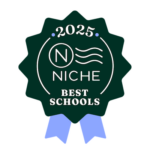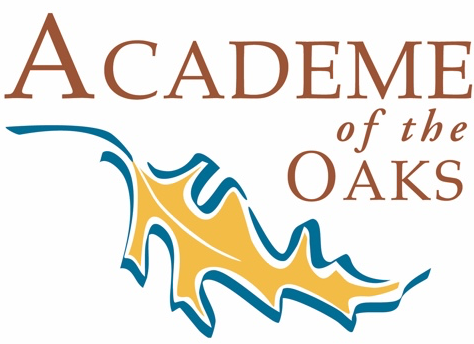Green School
Academe’s eco-education program combines theory and practice. The Environmental Science track class enriches students’ experiences in the Learning Garden and informs their participation in schoolwide efforts to “reduce, re-use, and recycle.”
In recognition of our consistent use of the Learning Garden as an outdoor classroom and our considered program of “green school” initiatives, the National Wildlife Federation’s Eco-Schools USA Program presented to Academe the prestigious Green Flag Award for exceptional achievement in “greening” the physical structures and grounds, conserving natural resources, and integrating environmental education into the curriculum.
Students are at the heart of Academe’s environmental initiatives.
They oversee the school’s energy and water usage and organize recycling and waste management programs, including waste-free days and a robust composting program.
We have installed a large rainwater cistern, Students will use a newly-installed rainwater cistern to water the school’s organic vegetable and pollinator gardens, which they tend with admirable care.
Taking care for the environment and the future of our planet is an integral part of our curriculum.
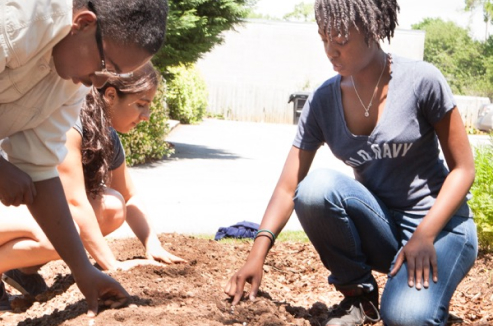
Learning Gardening
A garden is both a haven and a powerful educational tool. Academe of the Oaks has had a large organic vegetable garden since the school’s founding in 2003; the Tuscan garden was created in 2003, and the pollinator garden in 2014. The gardens are central to the eco-education program; they stimulate social interaction and collaborative learning; and they are beautiful, ever-changing, from planting to harvest.
While caring for plants and animals is a distinctly “on-going” endeavor, a project-based approach to improvements in the gardens provides a satisfying sense of completion and gives students ownership of both process and results. With the guidance of knowledgeable and experienced faculty, students learn about plants and insects and become acquainted with animal husbandry. Students maintain the food and pollinator gardens during the school year and through the summer, and they tend to the livestock: three goats and a flock of laying hens. Gardening is an essential piece of Academe’s school culture; it is a natural part of students’ year-round daily activities. Last summer, students, parents, siblings, and friends contributed more than 150 hours to the care of our gardens and livestock.
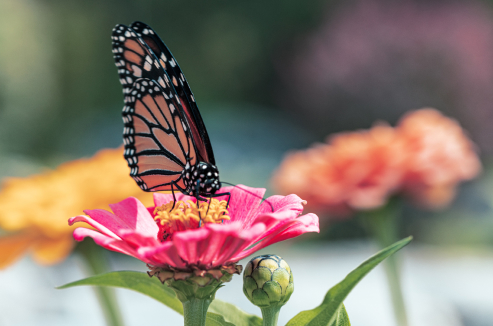
Pollinator Garden
Academe’s pollinator garden, established in 2014, features native and adaptive plants, including several varieties of the milkweed plants that are critical to the survival of Monarch butterflies. The plants of a pollinator garden attract bees, butterflies, hummingbirds, and other animals that feed from flowers and transfer pollen in the process. Our garden provides nectar flowers, host flowers, basking sites, appropriate water sources, and shelter from predators.
Students have produced a visitor’s guide to the plants (identified by common and scientific names) and to the pollinators, and they have built “insect condos” to attract beneficial insects. They have studied the impact of land cultivation and urban development on pollinator populations and their habitats, and the importance of healthy pollinator populations to agriculture.
The pollinator garden at Academe was made possible by a grant from Monarchs Across Georgia; it is a certified Monarch Waystation, and a member garden of the Rosalynn Carter Butterfly Trail. It is part of a broader effort to conserve and rebuild pollinator populations in Georgia and the Southeast.
Our programs encourage careful and compassionate observation and action that is thoughtfully integrated in our curriculum.

beekeeping
Honeybees are effective pollinators, and in this role they are essential to human survival. Academe has had honeybee hives on campus since the school’s founding in 2003. Students take care of two Langstroth honeybee hives at Academe. The bees are managed naturally: Beneficial nematodes are applied under the hives to manage hive beetle populations, and powdered sugar dusting combats varroa mites. When it is necessary to feed the bees with a sugar water solution, the solution is prepared with organic thyme and chamomile. Academe harvests honey every year but ensures that sufficient honey is left in the hives for the bees’ use over the winter months.
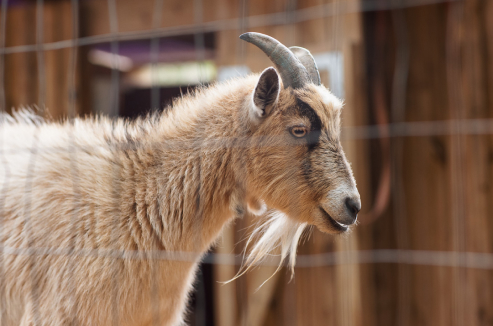
animal husbandry
Academe is a Green-certified school and our students are at the heart of Academe’s environmental initiatives. We have incorporated environmental science into the curriculum and expanded our gardening program to include animal husbandry. Our students tend to honeybee hives, a number of chickens and three of the cutest baby goats, Percy, Lance, and Biggie. And the cute goats are the ones that keep our animal team quite busy recently. It turned out that we received the babies at a too young of an age (six weeks) and the cold and rainy spring did not provide the best conditions. Under the loving care of Keif Schleifer, our animal care team has learned how to feed the babies with the bottle.
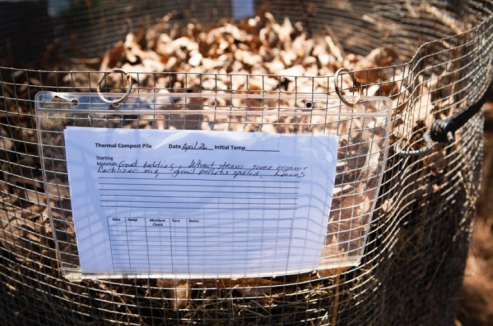
Composting and Recycling
Academe processes yard trimmings, animal bedding, and garden, food and paper waste on-site using hot composting and sheet composting methods. Striving to be a “zero waste” school, we have installed worm composting units to increase composting capacity; our goal is to compost or recycle 100% of our compostable and recyclable waste.
We strive, at Academe of the Oaks, to empower our students as stewards of the earth, to cultivate their capacities and instincts as responsible human beings on a fragile planet. Academe’s programs encourage careful and compassionate observation and judicious action: the science curriculum integrates theoretical understanding and practical care of the grounds, of the Learning Garden and of the livestock, to bring to students’ conscious awareness our environmental and ecological impact as a community of interdependent beings.
Green Flag Award
In recognition of our consistent use of the Learning Garden as an outdoor classroom and our considered program of “green school” initiatives, the National Wildlife Federation’s Eco-Schools USA Program presented to Academe the prestigious Green Flag Award for exceptional achievement in “greening” the physical structures and grounds, conserving natural resources, and integrating environmental education into the curriculum.
Want to learn more about our admissions process and take the next step to learn if Academe of the Oaks is right for your child?
146 New Street
Decatur, Georgia 30030
404.405.2173
